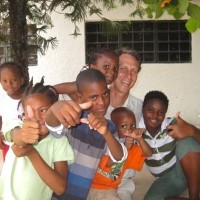THE HORRORS IN HAITI in January 2010 hit me deeply, and the call for doctors, surgeons and medical supplies to treat the hundreds of thousands of wounded pushed me into action. There are few times in our lives when we can contribute to something larger than ourselves; the week of the earthquake felt like one of those times for me. When we awoke the morning after the earthquake struck on January 12, 2010, my wife, Dr. Pier Boutin, and I knew we had to go. Within 24 hours our medical team—including my father-in-law, who is also an orthopedic surgeon, a nurse anesthetist, a critical-care nurse, and two Haitian intensive-care doctors working at Mount Sinai in New York—were on a loaned a private plane and just hours later, miraculously, were on the ground. We were accompanied on our mission by Dr. Paul Farmer (to the left of me in the photo above), the founder of Partners In Health, and two of his associates: Claire Pierre, a physician born and raised in Haiti, and a student of Farmer’s in his Global Health and Inequities program Harvard.
That first trip was an emotional and chaotic time. We worked in the General Hospital in conditions I describe as approximating Civil War medicine. We performed marathon surgeries under camping headlights using rusty hacksaws washed with vodka, and tended to thousands of patients who were lying on the ground outside the hospital many of whom desperately needed surgery to repair their crushed bones and festering wounds. Through it all I had the privilege of experiencing the indomitable Haitian spirit, and watched as slow progress was made to rebuild the medical infrastructure needed to heal this badly wounded country.
It is critically important that even months later, we do not forget those in ongoing need there. That is why seven months after the earthquake that devastated Haiti, I returned for the third time. This time, not to help the wounded or to perform surgeries, but to help facilitate further funding for the University Hospital and to feel and see with my own eyes what had changed, what hasn’t and what needs to. 60 Minutes did a recent follow up that reveals much of what I experienced while there. They were investigating what, if any, progress had been made since the devastation of the earthquake. What they found was disheartening. You can see the full story here:
The world has moved on to the next disaster, from the BP Gulf Oil Spill to the floods in Pakistan, but the memories of that first week after the quake — the smells, the loss, the destruction, the extraordinary heart of the Haitian people — worked its way under my skin. It is a part of me. It is the poorest nation in the Western hemisphere where 55 percent of the population earns less the $1.25 a day and 58 percent of children are under-nourished, and it is not rebounding. Though there is less rubble in the roads and pockets of rebuilding have started, still today 1.6 million people are homeless and still in the tent camps (often made from sheets and sticks) — or living on the median of a highway in Carrefour, doused in exhaust and dirt and hoping to survive each night as they sleep with cars flying by, deprived of all human dignity and decency as they bathe and defecate in view of everyone.
The night Wyclef Jean was disqualified from running for president (he has since petitioned to change the rules), a young energized crowd gathered outside the restaurant where they waited expectantly for the news. Long convoys of heavily armed UN peacekeeping forces in armored trucks patrolled the streets ready for riots that never came. As we quickly drove past the crowd, I asked Clairveux, our young driver, what he thought of the upcoming election in November. “Education is the only thing that will lift up the people”, Clairveux said. Most of the population in Haiti, where the life expectancy is 55, is under 30. They are the future of Haiti. Yet 85 percent of the education in primary and secondary schools is expensive and private.
 The most important determinant of the health of a population is not access to food, shelter, money, jobs or health care, but education. The health of Haiti reflects this education gap. It is a country, which has among the worst health statistics in the world — infant mortality (59 per 1000 live births vs. 2.4 for Bermuda), maternal death (only 25 percent of births occur in a health facility or with a birth attendant), and 50 percent of the population have no access to health care. Haiti has only one-fifth the minimum number of health professionals recommended by the World Health Organization, only 18 percent of women of childbearing age have access to contraception, and 2.2 percent of the population have HIV or AIDS …
The most important determinant of the health of a population is not access to food, shelter, money, jobs or health care, but education. The health of Haiti reflects this education gap. It is a country, which has among the worst health statistics in the world — infant mortality (59 per 1000 live births vs. 2.4 for Bermuda), maternal death (only 25 percent of births occur in a health facility or with a birth attendant), and 50 percent of the population have no access to health care. Haiti has only one-fifth the minimum number of health professionals recommended by the World Health Organization, only 18 percent of women of childbearing age have access to contraception, and 2.2 percent of the population have HIV or AIDS …
Read more about Dr. Hyman’s August, 2010 trip to Haiti:
See Dr. Hyman in the media on Haiti, January 2010: